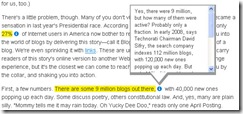BusinessWeek magazine must understand how to use web analytical data, at least a little. In its June 2, 2008 cover story titled "Beyond Blogs," Stephen Baker and Heather Green reveal that the magazine's web site got a lot of traffic from Google to its May 2, 2005 cover story titled "Blogs Will Change Your Business" since the article was the number one result for the keyword "blogs business."
Clearly, at least in this case, the magazine pays attention to different traffic sources to their site, and it acted upon this data.
Needless to say, much has changed in the blogosphere and now greater social media landscape that has made the 2005 story outdated. For instance, the article heavily featured Steve Rubel and his Micro Persuasion blog. Back then his blog was an authoritative resource for using emerging social media technology to influence the general public. In fact, it helped him get a job at the PR giant Edelman & Associates directing digital media work from an office overlooking Central Park in New York City. Not bad. However, he doesn't blog as much as he did back in 2005, and although he still holds a lot of clout in this realm, he attributes his lower frequency of blogging now to the fact that megablogs that actually hire full-time staffers like TechCrunch reign now. Further, in 2005 blogging was the big deal, but now a story like this must include so much more of social media.
 As the magazine realized that this article was no longer relevant to those searching for "blogs business," it decided to place an editor's note on the original article page and send visitors to a new page with revised content (for instance, the titled is now "Social Media Will Change Your Business") and provided annotated notes with updates from experts — see the image for this post to see how these updates appear on the site. It also used it blog to get feedback from what readers felt and wanted in the revised article.
As the magazine realized that this article was no longer relevant to those searching for "blogs business," it decided to place an editor's note on the original article page and send visitors to a new page with revised content (for instance, the titled is now "Social Media Will Change Your Business") and provided annotated notes with updates from experts — see the image for this post to see how these updates appear on the site. It also used it blog to get feedback from what readers felt and wanted in the revised article.
I think that using web analytics data to inspire an update to the article is brilliant for a couple of reasons. First, updating the article will keep people who visit the site from the search engines, since they really cannot take a look at the publication date of the article and move on to other search results in hopes of finding something more current. Second, this helps BusinessWeek assert itself as a great resource of updated information. Of course, I doubt that the magazine updates every article, but at least we know that it pays some attention to traffic data.
Does anyone else know of other news organizations acting in similar ways?
Sign up today to have our latest posts delivered straight to your inbox.